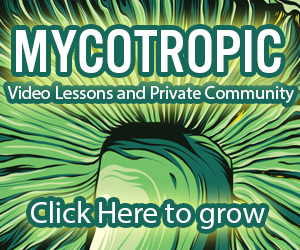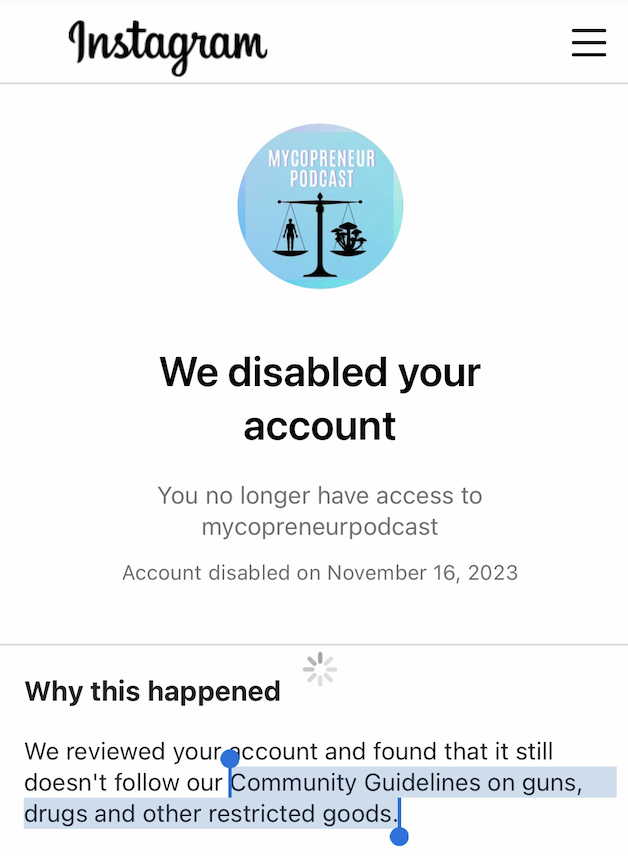On November 16, I posted an Instagram reel promoting a fully legal South African herb called Kanna in collaboration with the Healing Herbals supplement brand.
The video immediately generated public interest and discussion in the relatively obscure herb across Instagram and several other platforms where I had posted the clip. Real, traceable people shared their personal experiences with Kanna, best practices for consumption, scientific information about the plant (including links to academic resources on it), and more in a constructive and informed transparent public discourse.
Two hours later, my 25k follower Instagram account and professional network at @mycopreneurpodcast was permanently deplatformed despite having no warnings or previous strikes upon my library of content encompassing hundreds of similar original videos and posts over the previous three years. A final ambiguous and automated Instagram / Meta ban was effected under the auspices that my account ‘doesn’t follow our Community Guidelines on guns, drugs, and other restricted goods’ according to Instagram.
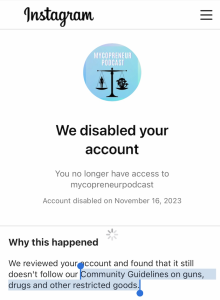
The Kanna video that triggered the ban remains up on TikTok and Twitter, where the same library of content I’ve accrued remains unaffected and in good standing with the community guidelines on those platforms. The best I can figure about how this ban took effect was that the Kanna supplement advertisement triggered an algorithmic sensor, which immediately suspended my account for 60 days with the chance to appeal. Knowing I’ve done nothing wrong, I immediately appealed. Within an hour, I received the message that my account had been permanently disabled, presumably because a closer AI-driven analysis of keywords used across my channel showed that I often share information about psychedelics.
For legitimate and lawfully-compliant small businesses and platforms in the psychedelic or cannabis space, being deplatformed is something of a rite of passage. While mainstream outlets like CNN, National Geographic, Oprah and ESPN have repeatedly devoted primetime coverage and shown unabashed enthusiasm for psychedelics over the last few years, social media platforms have taken to censorsing and deplatforming individuals and companies who talk about them.
The muddled and selectively-enforced censorship approach to the psychedelic conversation has created a cognitive dissonance in public perception and opinion around psychedelics, and more broadly, drugs. On one end of the spectrum is prohibitionist ‘Just Say No’ rhetoric, such as the laughably incompetent and misinformed official DEA messaging around psychedelics; on the other end of the spectrum is marketing hype and untempered glorification of the miraculous qualities of psychedelics, which have been trumpeted by leading cultural figures and global platforms as ‘Ten Years of Therapy In One Night’.
Here’s what the prohibitionist DEA has to say about ‘Hallucinogens’:
https://www.youtube.com/watch?v=2tsl-M3t14E
(notice the comments are turned off and there are no links to any researchers, peer-reviewed evidence, or clinical trials accompanying the bold and ‘factual’ claims presented in this video)
And here’s what WIRED has to say for Elon Musk, Sergey Brin, and the tech elite on the other end of the thought spectrum for ‘Hallucinogens’:
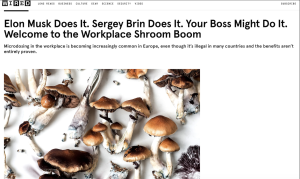
Here’s what the immensely popular and globally recognized Instagram account @mycopreneurpodcast has to say about ‘Hallucinogens’:
CENSORED
Having a psychedelic or cannabis centric social media account is inherently fraught with limitations and hairpin triggers. But the result of indiscriminate and random censorship of the public discourse around these culturally-mainstream substances on social media does more to amplify misinformation and propaganda than it does to ensure public safety.
Shifting policies and inconsistent, arbitrary censorship across different social media platforms contribute heavily to a scatter-brained, fragmented cultural dialogue and public opinion on psychedelics and cannabis.
The impact of throttling transparent and educated public discourse around psychedelics ultimately extends beyond the livelihoods of individuals working in these emerging markets, and directly into warping public perception of these substances as they’ve entered the cultural mainstream with no coherent approach to regulation and education around them.
The irony of it all is that psychedelics and drugs have never been easier to obtain, and the peer economy upheld via social media accounts has everything to do with this fact. Platforms like Instagram, TikTok, Facebook, LinkedIn, Pinterest and Reddit are absolutely filled with faceless, depersonalized accounts advertising bulk quantities of federally-illicit substances delivered via discreet shipping worldwide. Some of these accounts are obviously scammers, but many more are not.
Global society has a collective cognitive dissonance when it comes to how we think and feel about psychedelics, cannabis, and drugs in general. Policy in the United States currently reflects a divided approach to these substances; half the country seems to favor legalization and regulation, while the other half doubles down on prohibitionist rhetoric.
My account was banned on the same day that a number of other respected public figures across the psychedelic and cannabis spaces were also impacted by heavy-handed and arbitrary censorship.
In the same few hours that cannabis industry executive Luna Stower received restricted functioning on her Instagram account after a Meta photo sensor (photo censor?) picked up a ‘community guideline’ violation on a sign held up by a group of women visionaries in cannabis at an event celebrating their contributions to the multi-billion dollar space, my Twitter timeline randomly started populating with anti-cannabis, prohibitionist public policy think tank posts from the likes of notorious anti-cannabis alarmists Kevin Sabet and Parents Opposed to Pot.
The cognitive dissonance represented in drug messaging across social media and in society at large devalues centrist, informed and nuanced sense-making and encourages radical positions in favor of or opposition to psychedelics and cannabis.
Psychedelic and cannabis companies, influencers and advocates often circumvent the AI-algorithmic sensors by modifying their spelling of ‘weed’ to w33d’ and using emojis like the immortal red and white amanita mushroom character or a frog icon in place of the substances they’re referencing. When people are speaking, they might use creative phrasings or even bleep out the words ‘weed’ and ‘psilocybin’ etc.
This censorship evasion infantilizes the discourse around psychedelics and cannabis, which is exactly what happens on either side of the cognitive dissonance around these substances.
My stubborn commitment to accurate vernacular may have ultimately cost me my highest traffic social media account, which was permanently disabled with no prior warnings or content strikes.
Beyond a fragmented and illogical public discourse, the impact this deplatforming can have on legitimate small businesses and creators is profound. After organically building a global network of professionals and collaborators over three years of daily content posting, an ambiguous and AI-triggered infraction tied to a fully legal substance destroyed the entire ecosystem I’d painstakingly cultivated with no clear reason why.
I appreciate that some people will find this piece about losing my Instagram account immature and pedantic. But for small businesses and creators like myself, this account held tremendous value and served as a launchboard to opportunities around the globe including high-profile speaking gigs and features in mainstream platforms like Forbes and High Times , where the same messaging that got me banned by Meta is celebrated and platformed before a much larger audience than the 25k followers I had on IG.
In fact, the same week I was deplatformed from IG over ‘community guidelines’ violations, the exact same content I was sharing on Instagram earned Mycopreneur ‘Media Company of the Year’ at the Third Annual Wonderland Awards, where fellow nominees included multimillion dollar pharmaceutical companies and major figures like Andrew Huberman and Paul Stamets.
The impact of ambiguously-selective censorship and deplatformring of psychedelic social media accounts is disastrous for empowered public discourse. People who have cultivated a position of cultural influence through their transparent perspectives and educational outreach on these platforms are continuing to be robotically assessed as untrustworthy of participating in the digital public square that regularly platforms egregious misinformation and acts of state sanctioned violence, as well as non-science based drug propaganda portraying entheogens as illicit and dangerous substances.
Mycopreneur generated enough buzz on Instagram alone to break into mainstream media publications like Rolling Stone and Forbes, and the type of content that ultimately got me banned from the platform was openly celebrated by globally-renowned academics and researchers from institutions like Harvard and Imperial College London.
So many important perspectives and brands have had the plugs pulled on their social media accounts that being deplatformed essentially becomes a badge of honor and a rite of passage.
The fear-based response whereby legitimate psychedelic and cannabis accounts must walk on eggshells and self-censor their content is a race to the bottom for public safety.
As social media has become the de facto public square for people to connect with each other and learn about what’s happening in the world, it behooves everyone for tech companies to exercise more due diligence and discretion when restricting and censoring certain accounts.
Possible responses could include a weighting of the professional and actual human connections an account has, as indicated by publicly available information and cross-referencing. If an account has thousands of legitimate and public professional connections that they are tagged alongside at industry events and dinner parties, it stands to reason that they are more legitimate than an account with no personal photos that is explicitly selling drugs. This simple assessment of the network surrounding and supporting a person or brand engaged in these emerging industries should be enough to warrant free speech on these heavily-censored topics, but at the moment we have clearly incapable and illogical AI-driven algorithms determining the legitimacy of an individual or brand sharing information around psychedelics and cannabis.
Perhaps most alarming in this era of deplatforming cannabis and psychedelic adjacent businesses and platforms is the fact that paying tens of thousands of dollars in ad revenue per month is one of the most acceptable ways to remain above the ‘community policy’ in place. Ketamine clinics regularly advertise on Instagram, despite Ketamine remaining a Schedule 3 controlled substance under the Controlled Substances Act.
Insanely, there are also numerous psilocybin companies openly advertising via Meta-approved and sponsored ‘boosted posts’; I’ve received ads for a half dozen different companies openly selling psilocybin mushrooms or truffles through the Instagram platform itself – not random accounts advertising illicit substances mind you, but advertisements that Meta itself is pushing via boosted posts that were paid for by the companies. Check the screenshots below. Notice these targeted ads include respective pricing in U.S. Dollars, Mexican Pesos, and Euros, indicating that this Meta-approved and boosted illicit substance trade is worldwide. The posts themselves don’t disclose any words that would set off sensors, but simply clicking on the ads and visiting the company website will reliably prove that these items are in fact the controlled substances that they are surreptitiously being advertised as.
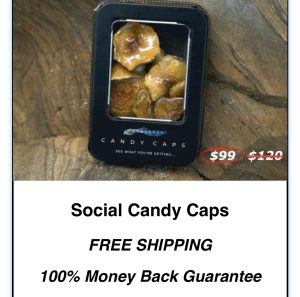
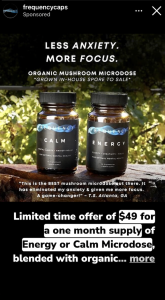
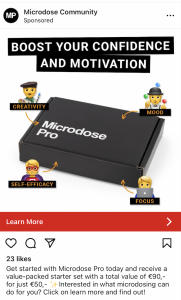
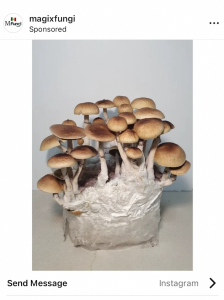
The future of psychedelics, cannabis, and other drugs in global society is actively being shaped at the granular level of public discourse happening right now on social media. As a collective, we must stop infantilizing the conversation around these substances and push back against draconian censorship and deplatforming of independent brands, journalists and activists who dare to speak and share openly about their personal experiences and perspectives on psychedelics if we are ever to have a truly humane and logical drug policy and corresponding global markets.



